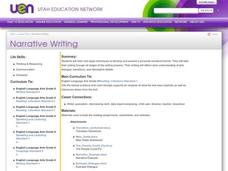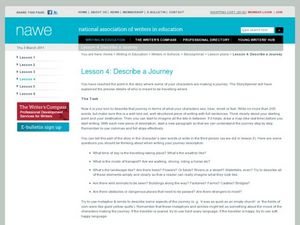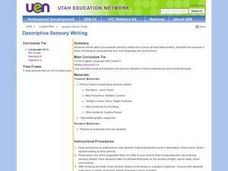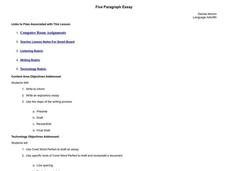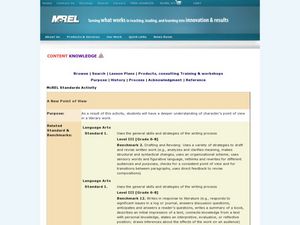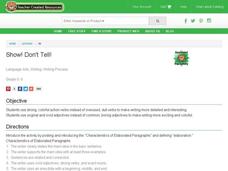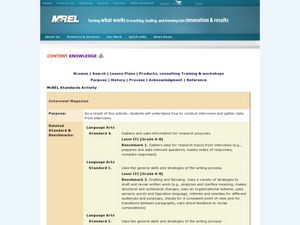Curated OER
Writing Organizers
Eight graphic organizers to choose from? That's right! Each of these organizers relates to writing or reading. From narrowing a writing topic, to responding to literature, to planning a writing project, you'll find many purposes for...
Curated OER
"The Charge of the Light Brigade": Writing Prompt and Pre-writing
Inspire your learners to experience poetry in an entirely different way with this resource. A writing prompt that goes along with "The Charge of the Light Brigade" by Alfred Lord Tennyson, learners craft a reflective piece in the voice...
Curated OER
Narrative Writing
Binoculars are used as a metaphor for good descriptive writing. Class members first view a small picture and then an enlarged view of the same image in which the details come into focus. Next, learners examine a paragraph lacking sensory...
Curated OER
Descriptive Writing: Parrot in the Oven
After reading a selection from Victor Martinez's Parrot in the Oven, pupils use the graphic organizer to decipher the sensory details within the descriptive paragraph. They list various details under the appropriate sense ("see," "hear,"...
Curated OER
Vivid Verbs
Spice up your writing! Your amateur writers will benefit from concentrating on understanding and improving verb use in writing. An introductory activity addresses weak verbs. A second exercise helps them see the importance of strong...
Curated OER
Describe a Journey
Students describe the sensory experience of a character's journey in an essay. For this precise details writing lesson, students explain the effects on the senses of weather, time of day, landscape, and other experiences. Students use...
Curated OER
Descriptive Prompt: Precise Language
Incorporate sensory details into a piece of descriptive writing. First, elementary and middle schoolers improve a piece of writing by using precise, vivid language, as well as appropriate word choice. They then listen to a variety of...
Curated OER
The Malnourished Paragraph
Students revise writing to improve style, word choice, sentence variety and subtlety of meaning after rethinking how questions of purpose, audience and genre have been addressed. They recognize the importance of details in writing.
Curated OER
Five Paragraph Essay
Eighth graders are introduced to the mechanics of writing a standard-form essay. They draft, edit and polish a five-paragraph essay about spending the day as an animal of their choice.
Curated OER
Accentuate the Expositive: Unit 2 Expository Writing
Students analyze narrative passages in order to improve their writing skills. In this narrative writing activity students use the same style of writing that they have analyzed in their own narrative passage.
Curated OER
Writing Descriptions of "My Favorite Place"
Young scholars write a descriptive writing piece. In this writing activity, students use a visualization exercise to add more descriptions to their writing.
Curated OER
A New Point of View
Analyze point of view and how it affects a literary work with this lesson. Middle schoolers create a written piece that focuses on point of view. They review the literary term "point of view," and explore examples of the term in text....
Curated OER
Imagery: Show, Don't Tell
A vampire, the beach, a bedroom, the school cafeteria. Writers are encouraged to add sensory details (sight, touch, taste, smell, sound) to bring these things to life.
Curated OER
Every Dog Has Its Day
Students explore the use of imagery in writing. In this writing lesson, students create a writing piece that features sensory images without resorting to the use of clichés.
Curated OER
Poetry: What's on Your Plate (Part 2)
Students write a short paragraph using strong descriptions. For this using modifiers lesson, students define modifier, adjective, adverb, metaphor, and simile. Students then write a journal entry in which they write about a favorite...
Curated OER
Multi-sensory Writing
Students use their senses to help describe special place they have been. They write short sensory-image essay that incorporate all five of their senses, and identify sensory language while reading different pieces of literature.
Curated OER
Character Sketch
Students view a PowerPoint presentation about Character sketches, and write a four paragraph character sketch. Emphasis is placed on topic sentences having one main idea per paragraph and elaborating. They study and discuss ways to write...
Curated OER
Show! Don't Tell!
Young scholars write a descriptive paragraph. For this writing lesson, students define elaboration and discuss the characteristics of an elaborate paragraph. Young scholars write a paragraph that contains vivid adjectives, strong verbs...
Curated OER
Nudging Questions
Students choose one topic to write about. They brainstorm ideas about their topic or incident. They use sensory details to visualize their topic. They answer a variety of teacher directored nudging question to help them describe their...
Curated OER
What's On Your Plate?
Learners keep running record of the activities they engage in and the food they eat. In this lesson on healthy living, students discuss the dangers of anorexia and bulimia, record their activity level and food consumption over the course...
Curated OER
Interview! Magazine
Students interview a subject and write a biographical sketch for a fictional magazine. In this interview lesson, students choose a person to interview and create two sets of questions. Students conduct the interview. Students then write...




